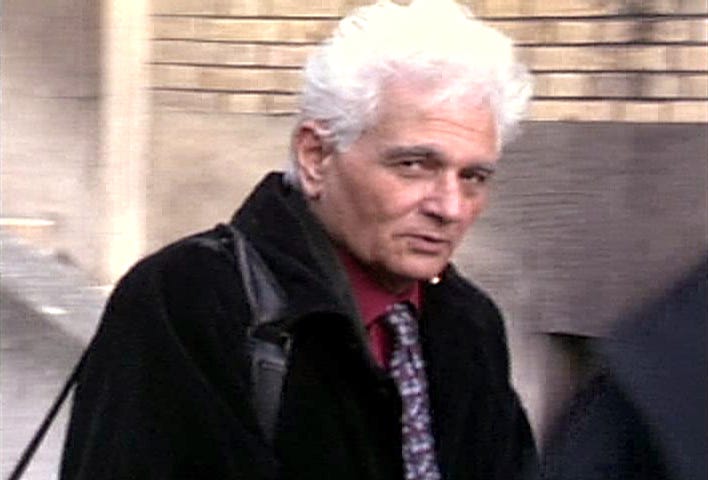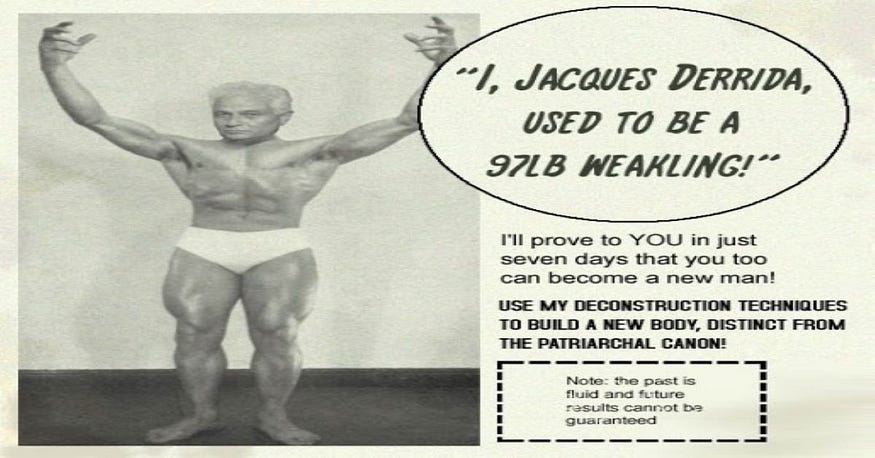How Derrida both did and did not erase “signs” (or “signifiers”), other referential words and books (i.e., rather than “texts”).

Many critics of the French philosopher Jacques Derrida (1930–2004) have stressed what they’ve called his “linguistic idealism”. Other critics always quote the words, “There is nothing outside the text.” (These words are from Derrida’s Of Grammatology of 1967. In French: Il n’y a pas de hors-texte — “There is no outside-text.”)
Of course when Derrida’s ideas are interpreted negatively in any way whatsoever (especially by an obvious Outsider-Other, rather than someone in Derrida’s “broad church”), then his fans immediately and instinctively say that he’s been “misinterpreted”. (Basically: “you don’t understand Derrida” = any negative criticism of Derrida.) Indeed some of his acolytes even indulge in ad hominems or plain abuse when faced with an Outsider-Other who dares to challenge the Master. All this seems to mean that only Derrida’s loyal fans and some well-chosen academic Experts ever get Derrida right…. And even they don’t get Derrida right according to other loyal fans and other well-chosen academic Experts.

Yet many of these seemingly (or supposedly) negative interpretations of Derrida can easily be traced back to Derrida’s own stress on what he called “the sign”. That is, way back in 1966/67 (in his lecture-cum-chapter ‘Structure, Sign and Play in the Discourse of the Human Sciences’), Derrida wrote the following:
“[T]he metaphysics of presence is shaken with the help of the concept of sign.”
In other words, Western philosophy (not only metaphysics) was deemed to be “shaken” when philosophers stressed the sign rather than the thing, the world, reality, (non-linguistic) ideas/meanings — or, to use Derrida’s own jargon, the transcendental signified.
It’s also worth noting Derrida’s words “the play of signification” (see full quote later) in his 1966 lecture and 1967 chapter. (The English literary theorist and Marxist Terry Eagleton used the phrase “floating signifier”.)
These words — and many others — are as close to Derrida admitting to his linguistic idealism and philosophical pranksterism than you could possibly get… However, since this isn’t the main theme of this essay, things will be left there.
Now since the lecture-cum-chapter ‘Structure, Sign and Play’ (as just mentioned in parenthesis) is the focus of this essay , here are a few words on that work.
This 1966 lecture was published in 1967 as chapter ten of Writing and Difference (French: L’écriture et la différence).
Derrida’s initial lecture was given at a conference which was intended to popularise structuralism. Ironically enough (or perhaps not), his lecture is often claimed to have been the beginning of post-structuralism — at least in the United States. In addition, Derrida’s 1967 book, Of Grammatology, is also cited as being the beginning of deconstruction.
Philosophical One-upMANship

It can easily be argued that one of Derrida’s main aims —both at this point in his career and forever after — was to one-up (or trump) other philosophers. So, in ‘Structure, Sign, and Play’, he even attempted to trump those philosophers who had themselves stressed (to use “Continental philosophy” capitals) The Sign.
It’s therefore ironic that one writer states that Derrida’s
“‘Structure, Sign, and Play’ identifies a tendency for philosophers to denounce each other for relying on problematic discourse”
when that’s exactly what Derrida does in that lecture-cum-chapter!
For example, in the passages focussed upon in this essay, Derrida “denounce[s]” the French anthropologist Claude Lévi-Strauss (1908–2009).

Of course both the writer of the passage above and Derrida himself might well have been fully aware of that self-referential (as it were) irony. Indeed perhaps that’s precisely what Deconstruction was all about to Derrida..
In any case, the following words show how Derrida attempted to one-up (or trump) Claude Lévi-Strauss:
“[A]s soon as one seeks to demonstrate in this way that there is no transcendental or privileged signified and that the domain or play of signification henceforth has no limit, one must reject even the concept and word ‘sign’ itself — which is precisely what cannot be done.”
So in what way is there “no transcendental or privileged signified”?
And does a stress on The Sign automatically erase The Signified?
Not according to Derrida.
In fact, in order to erase The Signified, The Sign must also be erased.
This is how Derrida argued his case.
Derrida’s basic point was that by the very fact of privileging The Sign (i.e., rather than privileging the “transcendental or privileged signified”), one effectively accepts the Transcendental Signified — or, at the least, one accepts its existence. In other words, it’s no use placing The Sign in the superior position (in the sign-signified “binary opposition” hierarchy) if that placement, by definition, is both an (implicit) acknowledgment of both the binary opposition and the very existence of The Signified. In other words, making any given x superior to any given y is still an acceptance of the existence — and even relative importance of — that y.
Thus Derrida one-ups Lévi-Strauss when he stated that “one must reject even the concept and word ‘sign’ itself”. That is, there can only be The Sign if there’s also The Signified. Or as Derrida himself put it:
“For the signification ‘sign’ has always been understood and determined, in its meaning, as a sign-of, a signifier referring to a signified, a signifier different from its signified.”
Again: when we talk of The Sign, there must also be The Signified. This is, in a strong sense, blindingly obvious! Of course The Sign is always a (to use Derrida’s word) “sign-of” something else. And that something else is, in Derrida’s parlance, The Signified.
So does all this mean that Derrida simply wanted to get rid of The Signified completely? And is the best way of doing this to get rid of The Sign too?
… After all, where there’s The Sign, there’s also The Signified.
Derrida’s Solution

The following is Derrida’s solution to this sign-signified binary opposition:
“If one erases the radical difference between signifier and signified, it is the word ‘signifier’ itself which must be abandoned as a metaphysical concept.”
Erasing The Signifier (or The Sign) does indeed seem truly “radical”..
That’s primarily because it should be noted that the term “signifier” is a term of art with a much broader significance. In other words, getting rid of The Signifier would also mean getting rid of all referential words and books (rather than “texts”). That’s because all these terms are words which also refer to — or are about — something that is non-linguistic. So they’re all, in basic terms, examples of The Signifier. Thus, according to Derrida’s logic, all referring words and books “must be abandoned” too!
(As the American philosopher ad pragmatist Richard Rorty put it in his ‘Texts and Lumps’: “texts” are about other texts; whereas books are — supposed to be? — about the world, things, objects, events, (non-linguistic) ideas/meanings, etc. That is, books are about The Signified; whereas texts are about The Signifier!)
That is truly radical one-upMANship.
Of course Derrida recognised Lévi-Strauss’s own attempt at philosophical one-upMANship. But he believed that Lévi-Strauss wasn’t manly enough for the job. This means that Derrida attempted to trump Lévi-Strauss’s own one-upMANship.
Or in Derrida’s own words:
“When Lévi-Strauss says in the preface to The Raw and the Cooked that he has ‘sought to transcend the opposition between the sensible and the intelligible by operating from the outset at the level of signs,’ the necessity, force, and legitimacy of his act cannot make us forget that the concept of the sign cannot in itself surpass this opposition between the sensible and the intelligible.”
So, as stated earlier, Lévi-Strauss’s very use of the word “sign” (i.e., even in his attempt to “operate” only at “the level of signs”) meant, to Derrida, that the French anthropologist had himself succumbed to The Signified in this simple inversion of the sign-signified binary opposition! Instead, according to Derrida, Lévi-Strauss should have completely abandoned the word “signifier” (or “sign”) because that word too is a deeply suspect “metaphysical concept”.
Is Total One-upMANship Possible?

It’s arguable that Derrida wasn’t actually attempting to one-up (or trump) other philosophers (or the entirety of Western philosophy) at all.
That’s primarily because Derrida fully acknowledged (in ‘Structure, Sign, and Play’ and elsewhere) that such a total one-upMANship is impossible. In that, Derrida was at one with Martin Heidegger (1889–1976). In On Time and Being, for example, Heidegger demanded that we (or at least philosophers) should “cease all overcoming, and leave metaphysics to itself”. And, of course, Derrida was well aware of Heidegger’s words and his general position.
Indeed Derrida himself wrote that overcoming The Sign “is precisely what cannot be done”. In more detail, Derrida also wrote:
“If one calls bricolage the necessity of borrowing one’s concept from the text of a heritage which is more or less coherent or ruined, it must be said that every discourse is bricoleur.”
[See bricolage.]
Yet deconstructing the Signified, and then going straight ahead and stating that the Signified can’t actually be overcome (as well as it being a folly to attempt to do so) can themselves be seen as being even purer and more extreme kinds of one-upMANship than anything Lévi-Strauss — or anyone else for that matter — had previously attempted to do.









No comments:
Post a Comment